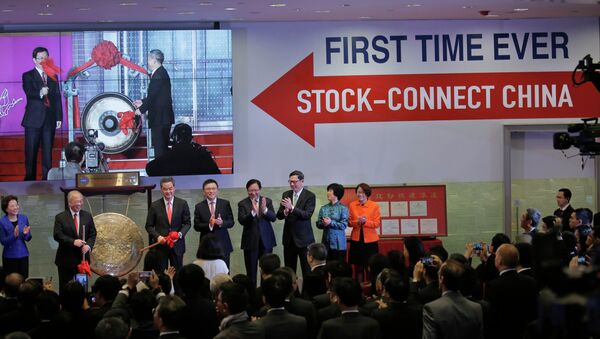MOSCOW, November 17 (Sputnik) — On Monday China has opened the Stock Connect scheme between the bourses of Hong Kong and Shanghai, allowing international investors to directly buy the mainland financial assets and for mainland capital to be invested in Hong Kong, a significant step in the liberalization of China’s money market.
The Stock Connect scheme allows international and Chinese investors to trade on the Hong Kong and Shanghai stock exchanges, enjoying an unprecedentedly wide access to both markets. This initiative lays a cornerstone for the possible future creation of the world’s third-largest bourse.
Equities in both Shanghai and Hong Kong rallied up at the opening on Monday, however, Hong Kong markets slid into negative zone eventually as local traders are overwhelmingly buying mainland assets. This ‘northbound’ trade has far exceed the volumes of mainland trade in the opposite direction so far, according to Bloomberg data.
“It’s another step in a very steady deregulating and opening up of the China markets, which in the long run has got to be good for everyone,” Simon Grose-Hodge of a Singapore-based LGT Group told Bloomberg. “The money flow was as we expected, with much more interest from investors getting into China rather than China getting into Hong Kong. There have been no errors as far as we can tell.”
Shanghai shares are almost sold out at this point as foreign investors have bought 13 bln renminbi ($2.1 bln) worth of mainland stocks, which caused a freeze in buy orders till the end of the day. Investors from mainland, however, have used only 1.7 bln renminbi ($280 mln) of the 10.5 bln renminbi ($1.71 bln) quota to buy in Hong Kong, which illustrates the gape disproportion in trade. Hong Kong’s Hang Seng is almost 1% down, while the CSI300 index of top Chinese shares slid 0.5% and Shanghai Composite index is 0.2% down after the initial gains of up to 1%. In case with Hong Kong, markets are in the negative because the analysts previously anticipated a 13 bln yuan ($2.12 bln) influx of investment money due to the exchange link opening, which turned out to be 10 times less than expected.
In the long-term, both mainland and Hong Kong are likely to benefit from the now-active financial link, which Charles Li, chief executive of the Hong Kong stock exchange, referred to as a “historic moment”. For China, the connection provides a new source of investment capital, which the nation is starved for.
“This is the primary vehicle for China to take the next step to opening up its capital market to the rest of the world,” Mark Matthews of the Singapore branch of Bank Julius Baer & Co told Bloomberg. “It’s a positive move for the long term.”
Shanghai finance sector is likely to be booming in the future as foreign investors will now be more active in China’s market. More mainland enterprises will now have a direct access to international capital, which will help them boost competitiveness.
For Hong Kong, however, the prospects are not that rosy. As today’s trading session has shown, mainland investors do not have much money to offer to Hong Kong, and even when they do, there is enough international capital in the city already. This means that Hong Kong has lost its unique position as a money gateway to the mainland, being replaced by Shanghai and having almost nothing in return.
“It looks like overseas investors favor the stocks without Hong Kong listings,” Dai Ming of the Shanghai-based Hengsheng Asset Management Co. told Bloomberg. “There isn’t much enthusiasm toward Hong Kong.”
International investors, on their part, are enthusiastic towards the new opportunities, as they have traded in Hong Kong for many decades now, while mainland access is something exciting. The Stock Connect has given them a unprecedented access to China’s $4.2 bln-worth market.
All in all, mainland China is moving towards a greater integration into the global economy on the open market conditions. “It’s a pragmatic, positive move,” Adrian Mowat of JPMorgan Chase & Co., said as quoted by Bloomberg. “It’s part of this progressive opening of the Chinese financial system to the global financial system.”
Other measures of financial market liberalization, undertaken recently by Beijing, are opening the offshore renminbi trading centres from Sydney to London and currency swaps between China and oil-producing nations of the Middle East, as well as Russia.
However, concerns are rife over the future of the world’s second-biggest economy. The local governments’ indebtedness and falling competitiveness in the manufacturing sector may be partially addressed by the Stock Connect opening, but the looming real estate bubble will only expand of the money influx.

